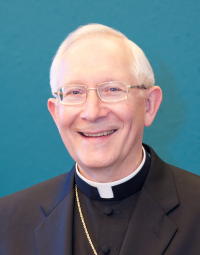
Archbishop Leonard P. Blair
As Easter draws near, my wish for you is that the crucified and risen Lord will fill your life with light and joy! What we read in the Gospel and what we celebrate at the liturgy from one season to another are not simply a historical remembrance of things past. Scripture and the mysteries of redemption are living realities here and now because the risen Christ is alive and active. Having passed outside of space and time (something impossible for us to comprehend), Jesus is always simply “present” in both dimensions. Easter is “today” every bit as much as it was 2,000 years ago.
From the earliest centuries, Christians have recognized that every first day of the week — every Sunday — is a little Easter. St. Augustine says that Sunday is “a sacrament of Easter.” And St. Jerome writes: “Sunday is the day of the resurrection, it is the day of Christians; it is our day.” The earliest Christians observed Sunday at all costs even though it was a secular work-day in the ancient world. Sometimes, they paid with their lives. To their Roman persecutors the martyrs of Abitina in North Africa said: “Without fear of any kind we have celebrated the Lord’s Supper, because it cannot be missed; that is our law … We cannot live without the Lord’s Supper.” “We cannot live without the Lord’s Supper.” Yet the pandemic made Sunday Mass attendance difficult, even impossible.
Now, as the threat of the pandemic eases it is essential for the practice of our faith and our spiritual well-being that we go to Sunday Mass. The Eucharist is not a “virtual reality” but an act of worship and communion, body and soul. No one would say that contact with loved ones during the pandemic by iPhone or Zoom can replace actually being with them. Neither can a televised or livestream Mass replace going to church and receiving our Lord himself in holy Communion. Unless we are homebound because of illness or age, we really need to be at Mass.
For those Catholics who say that they needn’t go to Sunday Mass because they can pray “just as well at home,” Pope St. John Paul once wrote this: “It is not enough that the disciples of Christ pray individually and commemorate the death and resurrection of Christ inwardly, in the secrecy of their hearts. Those who have received the grace of baptism are not saved as individuals alone, but as members of the mystical body, having become part of the people of God.
It is important, therefore, that they come together to express fully the very identity of the Church … (no. 31)” The Pope goes on to teach that those who absent themselves from Sunday Mass are depriving themselves of the spiritual nourishment and spiritual solidarity that only the Eucharist can give. Quoting St. Paul, he writes: “The Eucharist feeds and forms the Church: ‘Because there is one bread, we who are many are one body, for we all partake of the one bread.’ (1 Cor 10:17)”
For all these good reasons, the Church from earliest times has expected the faithful to participate in Mass every Sunday, and has not ceased to confirm this obligation of conscience as entailing a grave obligation. Sunday Mass is a fulfillment of the Third Commandment (“Remember to keep holy the Lord’s Day”).
This is the teaching of the Catechism, and it is easy to understand why if we keep in mind how vital Sunday is for the Christian life. Even before the pandemic, Mass attendance in the Archdiocese of Hartford was not what it should be. It would be a great Easter gift and act of spiritual kindness on our part if we were to lead back to Sunday Mass those of our relatives, friends and neighbors who do not attend. Ask God for the courage to invite them! And may you be blessed with a grace-filled Holy Week and blessed Easter.
